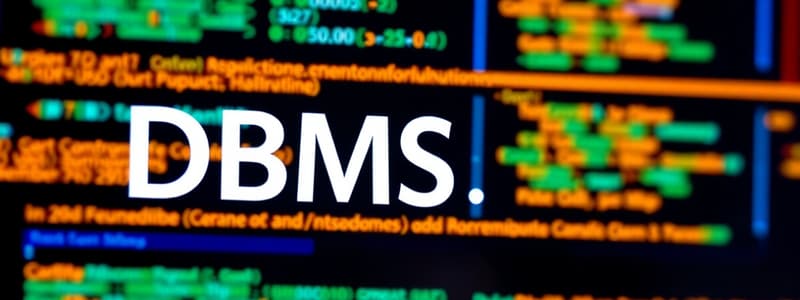Podcast
Questions and Answers
Which operation is NOT performed on a database?
Which operation is NOT performed on a database?
- COMPRESS (correct)
- DELETE
- UPDATE
- INSERT
What role does a Database Management System (DBMS) serve?
What role does a Database Management System (DBMS) serve?
- It provides an interface for interacting with the database. (correct)
- It serves as a security barrier for the data.
- It compresses data for storage.
- It performs real-time data analysis.
Which of the following is NOT a type of database model?
Which of the following is NOT a type of database model?
- Graph-based (correct)
- Networked
- Hierarchical
- Relational
Which SQL statement group is used to define the structure of the database?
Which SQL statement group is used to define the structure of the database?
In a relational database, what does a table represent?
In a relational database, what does a table represent?
Which is a characteristic of Structured Query Language (SQL)?
Which is a characteristic of Structured Query Language (SQL)?
Which of the following is considered a common Database Management System (DBMS)?
Which of the following is considered a common Database Management System (DBMS)?
What is the purpose of Data Control Language (DCL) in SQL?
What is the purpose of Data Control Language (DCL) in SQL?
Flashcards
Database
Database
A structured collection of data organized for easy retrieval, management, and updating.
Database Management System (DBMS)
Database Management System (DBMS)
Software that provides a user interface to interact with a database.
SQL
SQL
Structured Query Language; a formal language used to interact with databases.
Relational Database
Relational Database
Signup and view all the flashcards
Table (in a Database)
Table (in a Database)
Signup and view all the flashcards
Column (in a Table)
Column (in a Table)
Signup and view all the flashcards
Row (in a Table)
Row (in a Table)
Signup and view all the flashcards
Data Manipulation Language (DML)
Data Manipulation Language (DML)
Signup and view all the flashcards
Data Definition Language (DDL)
Data Definition Language (DDL)
Signup and view all the flashcards
Study Notes
Database Management Systems (DBMS)
- A database (DB) is a structured collection of data organized for easy retrieval, management, and updating.
- A DBMS is software that provides tools to interact with databases.
- The primary function of a DBMS is to act as an interface between users and the database.
- Users interact with a DBMS using queries and commands.
- DBMSs organize and manage data, allowing for efficient access and modification.
SQL (Structured Query Language)
- SQL is a standard language for managing and manipulating data in relational databases.
- SQL is declarative, meaning users specify what they want, and the DBMS determines how to retrieve the data.
- SQL is not a procedural language; it focuses on the outcome rather than the specific steps to achieve it.
- SQL commands can be categorized into three main types (DDL, DML, DCL):
Data Definition Language (DDL)
- DDL commands are used to define the structure of a database (e.g., create tables).
- It defines the schema, constraints, and relationships within the database.
Data Manipulation Language (DML)
- DML commands are used to manipulate the data in the database (e.g., insert, update, and delete records).
- This includes operations to query, modify, and retrieve data from tables.
Data Control Language (DCL)
- DCL commands deal with user permissions and access control.
- They define who can perform specific actions (e.g., grant, revoke).
Relational Database Management Systems (RDBMS)
- RDBMS is a database management system based on the relational model.
- The relational model organizes data into tables with rows and columns.
- Rows represent records, and columns represent attributes.
- Relationships between tables are defined using keys (primary and foreign keys).
- Popular RDBMS software includes Oracle, MySQL, Microsoft SQL Server, PostgreSQL, and MongoDB.
- RDBMS models commonly include relational, hierarchical, and network models.
Popular RDBMS Software
- Oracle, MySQL, Microsoft SQL Server, PostgreSQL, and MongoDB are examples of popular database management systems.
- Different software options offer various features and functionalities for different needs.
Additional Information
- Numerous online resources are available for further learning about SQL and database management.
- Various websites provide tutorials, documentation, and practice exercises.
Studying That Suits You
Use AI to generate personalized quizzes and flashcards to suit your learning preferences.
Related Documents
Description
This quiz covers essential concepts of Database Management Systems (DBMS) and Structured Query Language (SQL). You'll learn about the role of a DBMS, how it interacts with users, and the various SQL command types such as DDL, DML, and DCL. Test your knowledge on how these components work together to manage and manipulate data effectively.




